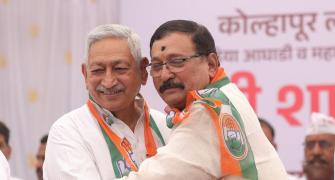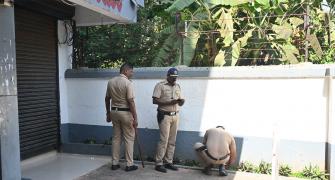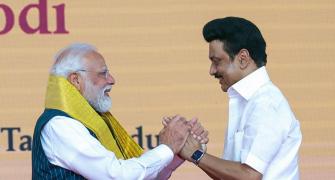It was a year of missed opportunities and going back on reforms for India's oil sector, which came under severe strain from international oil prices shooting to record highs and flamboyant domestic firms running out of luck in pursuit of oil and gas at home and abroad.
Administered pricing for auto fuels was back as government showed little innovation in dealing with the spurt in international oil prices that touched $56 a barrel.
The diplomat-turned politician minister Mani Shankar Aiyar saw more merit in reversing two-year-old free pricing policy for petrol and diesel and sought two-year extension of the subsidy regime on LPG and kerosene that was to end in March 2005.
Aiyar, a person known to have his way with words, failed to charm oil-rich nations into giving the 70 per cent import dependant nation any significant oil and gas property in 2004.
He was also accused of trying to curtail autonomy of state firms when he tried to vet their integration plans, similar to the ones adopted by global oil majors to last through difficult times like shooting up of oil prices in the second half of 2004.
India lost prized oil and gas properties in Angola, Russia, Sudan and Myanmar to China while Beijing did all the talking through financial aid packages, especially to African countries.
Aiyar also toyed with the idea of merging two or more state-run firms to form a monolith on a global scale but the committee he appointed to suggest the public sector recast could not get the approval of the Cabinet Secretariat.
While petrol and diesel prices were not increased in the first five months of 2004 due to Parliamentary elections, duty was changed twice in the remaining part of year but was insufficient to cover for the spurt in international oil prices.
Public sector oil firms lost close to Rs 13,000 crore (Rs 130 billion) in 2004 on selling petrol, diesel, LPG and kerosene below the imported cost.
And programmes like doping ethanol with petrol, aimed at cutting India's import dependence, were put on backburner due to shortage of sugarcane crop.
Aiyar sought to use his diplomatic experience in the petroleum ministry but it appears to have not made any big breakthrough.
Having begun importing liquefied natural gas from Qatar in the beginning of 2004, India failed to clinch a deal with Iran for sourcing LNG as Tehran raised the bar after New Delhi deterred for months on accepting a price slightly higher than the Qatari price.
Public and private sector firms did have luck in their oil and gas hunt. Oil and Natural Gas Corp, for one, was extremely unlucky despite spending close to a million dollar every day in its deep sea hunt.
In retailing, Reliance Industries and Essar Oil made a slow but steady progress in putting up their auto fuel retailing network even as Royal Dutch/Shell made a quiet comeback to retailing scene after nearly three decades.
But Shell's plan to import LNG at Hazira were affected by an order of the shipping ministry asking the multinational to transport the fuel only in Indian flagged vessels.
On the brighter side, Petronet LNG made a successful initial public offer around the same time as it operationalised the country's first LNG terminal at Dahej.
The government also sold its minority shareholding in ONGC and GAIL through public offers to a resounding success after its initial attempts to garner funds by privatisation of Hindustan Petroleum Corp and Bharat Petroleum Corp were challenged in the Supreme Court.
The change of guard at the Centre put a lid on the privatisation attempts with the UPA government saying a firm no to sale of equity in PSUs in the strategic sectors.
However, in the process, the issue of unlocking the non-strategic equity holding IOC, ONGC and GAIL have in each other also got affected.
OVL, the overseas arm of ONGC, meanwhile continued its acquisition spree getting stakes in oil and gas properties in Australia and Ivory Coast, taking the number of countries it is present in to 10.
Public sector oil firms continued to squander the little opportunities coming their way as they squabbled with each other rather than fighting competition.
While BPC pitched in for a pie of fuel retailing in Sri Lanka where Indian Oil Corp is already a force to reckon with, GAIL squabbled with ONGC over stake of Block A-3 in offshore Myanmar.
In Sudan, ONGC and IOC were face to face over a refinery upgradation project while Iranian offer of a share of the gigantic South Pars gas field to IOC was sought to be shared by GAIL.
IOC and GAIL raised the pitch for having an upstream arm and sought either being allowed to form a subsidiary for acquisition of oil and gas properties or equity in ONGC Videsh Ltd, the country's flagship overseas acquisition firm.
IOC got its act together and went shopping for a small to medium-sized E&P firm in Europe. GAIL continued to focus on getting small stakes in city gas distribution projects. Also, IOC outbid GAIL for a stake in loss-making Haldia Petrochemicals.
The state refiner continued its focus on petrochemicals, converting its grassroot Paradip refinery in Orissa into a petrochem-cum-oil refinery. ONGC planned to set up LNG import terminal, petrochemical project and power plant near its recently acquired Mangalore Refinery but Aiyar objected to the integration.
The refiners - both in the public and private sector - lagged in putting up facilities for producing Euro-III and Euro-II emission norm complaint fuels resulting in slippage in the April 1, 2005 deadline for production of the former in metro cities and later in the rest of the country.







